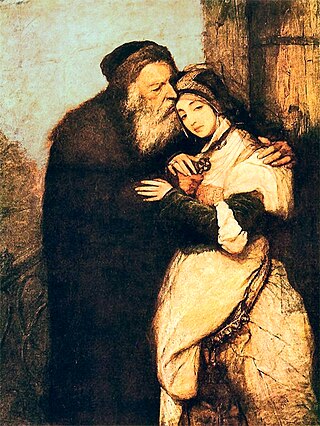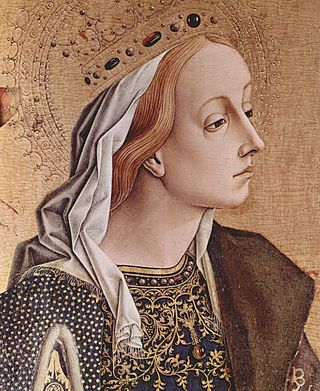Brennan is an Irish surname which is an anglicised form of two different Irish-language surnames: Ó Braonáin and Ó Branáin. Historically, one source of the surname was the prominent clan Ua Braonáin (O'Brennan) of Uí Duach (Idough) in Osraige who were a junior Dál Birn sept stemming from a younger son of Cerball mac Dúnlainge (d.888). Recent surname evaluations highlighted the geographic consistency of this lineage in the barony of Idough. However, based on the ultimate authority of Dubhaltach Mac Fhirbhisigh they are out of Ui Dhuinn (O’Dunn) and, therefore, an Uí Failghi tribe, not Osraige. While it is clearly apparent that O’Hart's pedigree is erroneous, it is suggested that Ó Cléirigh probably became confused while transcribing from Mac Fhirbhisigh. This is echoed by the modern scholar, Bart Jaski.
Amanda is a Latin feminine gerundive name meaning, literally, "she who must be loved". Other translations, with similar meaning, could be "deserving to be loved," "worthy of love," or "loved very much by everyone." Its diminutive form includes Mandy, Manda and Amy. It is common in countries where Germanic and Romance languages are spoken.

Ciarán or Ciaran is a traditionally male given name of Irish origin. It means "little dark one" or "little dark-haired one", produced by appending a diminutive suffix to ciar. It is the masculine version of the name Ciara.
Fiona is a feminine given name of Gaelic origins. It means white or fair, while the Irish name Fíona means 'of wine', being the genitive of fíon 'wine'. It was coined by Scottish writer James Macpherson. Initially, the name was confined to Scotland but later it gained popularity in other countries, such as Liechtenstein, Switzerland, Australia, Germany and Canada.

Sarah is a common feminine given name of Hebrew origin. It derives its popularity from the biblical matriarch Sarah, the wife of Abraham and a major figure in the Abrahamic religions. It is a consistently popular given name across Europe, North America, and the Middle East — being commonly used as a female first name by Jews, Muslims, and Christians alike, and remaining popular also among non-religious members of cultures influenced by these religions.
Megan is a Welsh feminine given name, originally a diminutive form of Margaret. Margaret is from the Greek μαργαρίτης (margarítēs), Latin margarīta, "pearl". Megan is one of the most popular Welsh-language names for women in Wales and England, and is commonly truncated to Meg.

Hannah, also spelled Hanna, Hana, Hanah, or Chana, is a feminine given name of Hebrew origin. It is derived from the root ḥ-n-n, meaning "favour" or "grace". A Dictionary of First Names attributes the name to a word meaning 'He (God) has favoured me with a child'. Anne, Ana, Ann, and other variants of the name derive from the Hellenized Hebrew: Anna (Ἅννα)

Jessica is a female given name of Hebrew origin.

Kate is a feminine given name, and a short form of the names Katherine, Caitlin and others.
Lindsay is both a Scottish surname and a given name. The given name comes from the Scottish surname and clan name, which comes from the toponym Lindsey, which in turn comes from the Old English toponym Lindesege for the city of Lincoln, in which Lind is the original Brittonic form of the name of Lincoln and island refers to Lincoln being an island in the surrounding fenland. Lindum Colonia was the Roman name of the settlement which is now the City of Lincoln in Lincolnshire. Lindum was a Latinized form of a native Brittonic name which has been reconstructed as *Lindon, which means "pool" or "lake" and refers to the Brayford Pool.
Leanne, LeAnne, Leann, LeAnn, Lee-Anne, Lee Anne, Lee-Ann, Lee Ann, Li-Anne, etc. are female given names and may refer to one of the following people:
Natalie or Nathaly is a feminine given name derived from the Latin phrase natale domini, meaning "birth of the Lord". Further alternative spellings of the name include Nathalie, Natalee, and Natalia/Natalija.
Tina is a female given name. It is diminutive for names such as Albertina, Bettina, Christina, Christine, Kristina, Martina, Valentina, Faustina, etc. Its masculine counterpart is Tino or Tin. In Finland and Estonia, the name is written as Tiina. The word itself may have originated from Old English Tyne/Tyna/Tina, meaning river.

Diana is a feminine given name of Latin and Greek origins, referring to the Roman goddess Diana. It came into use in the Anglosphere in the 1600s by classically educated parents as an English-language version of the French version of the name, Diane.
Ferguson is an Anglicization of the Scots Gaelic "Macfhearghus", a patronymic form of the personal name Fergus which translates as son of the angry (one).

Stephanie is a female name that comes from the Greek name Στέφανος (Stephanos) meaning "crown, wreath, garland". The male form is Stephen. Forms of Stephanie in other languages include the German "Stefanie", the Italian, Czech, Polish, and Russian "Stefania", the Portuguese Estefânia, and the Spanish Estefanía. The form Stéphanie is from the French language, but Stephanie is now widely used both in English- and Spanish-speaking cultures.
Sue is a given name and a common short form of the following female given names:
Thorn is a surname that may refer to:
Leigh is both an English surname and a unisex given name meaning "meadow" and "delicate".
Tracy, as a British personal name, was originally adopted from Norman surnames such as those of the family de Tracy or de Trasci from Tracy-Bocage in Normandy, France. Derived from the Gaulish male name Draccios, or Latin Thracius, and the well-identified Celtic suffix -āko, such Norman surnames themselves sprung from several Tracy place-names in France.






